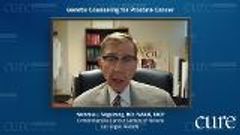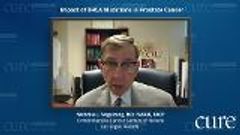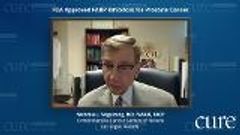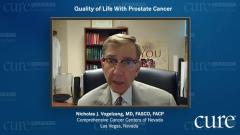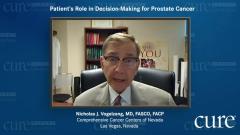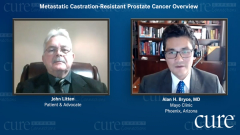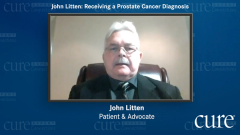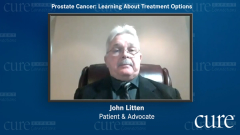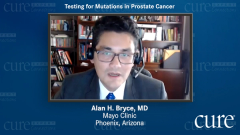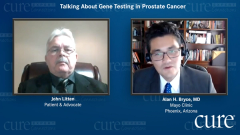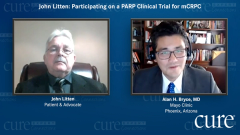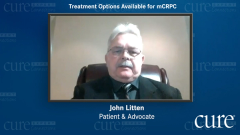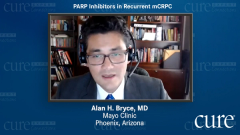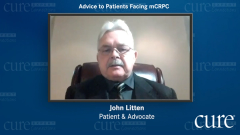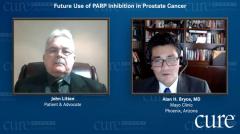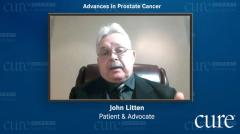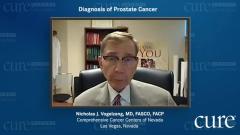
Treatment Options Available for mCRPC
Episodes in this series

Alan H. Bryce, M.D.: Let’s discuss treatment options. In your case, John, we’ve been through a number of treatment options, first-line hormonal therapy with Lupron, you got the Provenge, the sipuleucel-T, next-generation hormone therapy with pills, and then chemotherapy ultimately and now rucaparib.
That list represents much of the diversity, almost all the diversity, of systemic therapies for prostate cancer. There are other drugs in these categories—we haven’t necessarily used them all—but in broad terms, the combination of hormone therapy, chemotherapy, next-generation testosterone targeting, immunotherapy, and PARP inhibitors are just about all the categories, the last one being the IV [intravenous] radiopharmaceuticals like radium Ra 223 dichloride.
There are three major points. One is the journey of treating advanced prostate cancer is best viewed in total. We’re never talking about one treatment at a time but rather how we combine all these treatments to get you the best cumulative result. Right? Because there’s an interaction. Whatever you do first affects what you do second, and we always want to get the best combination and think in long-term terms, not just short term. But we also talked about the importance of focusing on your goals, how you define quality of life, and what your priorities are, so that we were really choosing therapy in a way that met your expectations. Every patient is different. We always emphasize in clinic that I never want to dictate to the patient what needs to happen. My job as your physician is to understand you, understand who you are, what you want, what’s acceptable to you and what’s unacceptable, and then give you the best option that I think fits what you want.
Perhaps with all those concepts in mind, did you feel like you understood the options along the various steps as we talked about them? You already told us that your daughter also always played a key role as the health care professional in the family in helping you work through it. What advice do you have for patients as they’re trying to have these conversations with their doctors?
John Litten: It takes a lot of introspection. You have to soul search. Things that are important to you that you might be willing to let go of—it’s better for your health if it makes sense because of the disease you’ve contracted. My journey on this started when I was 60 years old, and just last month I turned 71. Through those 65-plus, last five, six years, I’ve noticed a lot of changes in just aging in myself. What’s important is not struggling with aging. I used to go out and work out at the gym five days a week. Maybe you have some fatigue from the treatments or whatever you’re having but allow yourself to cut back, to let go of a couple of these things. Rather than being beneficial because you’re out there and maybe you’re missing one or two days a week of your physical exertion, you’re saving on the other side not stressing out about what it might do without being able to do that, that I’m losing my manhood. There’s a myriad of things that go through your head.
The important part is you just want to do the best thing for your body while you’re on treatment and extend your life. That to me was the sole objective here. I also felt because I got into participating in the human trials side of it, you would be excited about some of the results that were coming out of it. I felt I was doing good for everyone else. You need to find something that makes you feel good about where you are and how you’re going through the treatments. You’ve got to let yourself accept the disease, and then hopefully your caregiver and your family also accept the disease that you have and are just supportive of you, that they’re not trying to tell you, “Don’t do this. Don’t do that. Don’t listen. Go to a naturopath.” There are a million different directions you can go, but I’m here to give a testament to following the protocols that are out there today on the more advanced research techniques that are available to people with our kind of cancer. I swear by it 100%.
Alan H. Bryce, M.D.: It’s inspirational to hear you talk about it. There’s no question. The future patients, patients watching this now, owe you a debt of gratitude. You have absolutely changed the field with your participation in studies. Being one of the men who took the risk to say I believe in this concept, I want to take the chance—obviously it’s paid off for you personally, but of course you don’t know that when you sign up. You don’t know in advance that this is the one that’s going to work for you. Of course, it’s my job to make sure that it is, and that’s what I’m trying to do. Right?
Without question, every decision we make has risks and benefits. There’s always a certain gamble at some level or another. Thank you for your courage. Without question, the physicians and the patients with prostate cancer, we all owe you a debt of gratitude for having that courage to make these decisions.
Transcript Edited for Clarity

